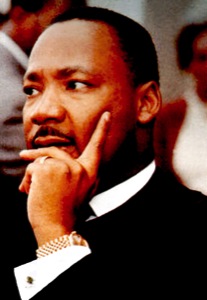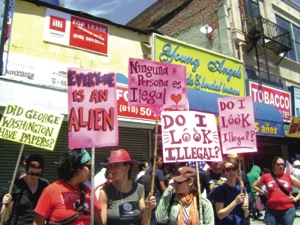
Mention civil rights movements to most people and thoughts of old black and white news footage of marches, school bussing protests and Martin Luther King Jr. speeches come to the minds of many. Others think of Latino immigration and social-equality demonstrations, while still others highlight the LGBT struggles to overturn “Don’t Ask, Don’t Tell” and the ongoing battle for same-sex marriage rights.
With February being African American History Month this is the time many remember generations of African Americans who struggled with adversity to achieve full citizenship in American society.
However, while the black civil rights movement, for example, does share certain elements with the LGBT rights movement – such as a shared goal of an end to discrimination, a shared vision of common decency and an end to physical persecution and violence – many see the black struggle as being of far greater magnitude. This includes embracing historical and societal persecution, such as slavery, along with a crushing generational economic disadvantage on a massive society-wide scale.
That said, all civil rights movements share the common aim of obtaining “equality” in the eyes of those who feel wronged. In addition, the various ethnic and social groups involved in those struggles are not mutually exclusive in either their goals or in how they should be obtained.
Martin Luther King Jr. expressed it well when he challenged society to just do what is “right.”
“Never, never be afraid to do what’s right, especially if the well-being of a person or animal is at stake. Society’s punishments are small compared to the wounds we inflict on our soul when we look the other way.”
Says Carolina Alcoser Ramos, director of Community Programs and Latino Services at the San Diego LGBT Community Center, “Any struggle that involves the violation of our human rights is a civil rights issue. Although the details may be different, the African American, Latino and LGBT communities have all worked together as allies in the struggle for equality.”
Pat Washington, PH.D., running for the Assembly in 2012 and currently the co-chair of the LBGT caucus of the California Democratic Party, believes the struggle for equality links all such movements. Says Washington, “The similarities are that each group has to struggle for equal and appropriate treatment in education, housing, employment, medical care and for equal status in all areas of life.”
However, she also identifies a common occurrence between such groups, “A sad parallel is that often each group is confronted by individuals and groups within their movements who want to maintain the status quo.”
For Larry Baza, 2011 Champion of Pride award winner, the lack of rights is a common thread. “There are parallels and similarities between the civil rights movements of African Americans, Latino Americans and the other communities of color,” says Baza. “The most basic one is that each of these movements is driven by the need to address the denial of rights guaranteed to all citizens by the U.S. Constitution.”
For Baza, violence is also an important factor. “Additionally, hate crimes committed against and upon LGBT people and people of color, both violent and non violent, continue to be catalysts in the fight for equality and civil rights.”
Differences between the rights movements are often spoken about in the same breath as similarities and parallels. However, for Ramos, any apparent differences among the movements should be viewed as divisionary. “A struggle is a struggle. There are only perceived differences that have been reinforced by our media and educational system, which leaves no room for creating bridges amongst the diverse communities in which LGBT folks have always existed.”
For Washington, differences can often be misconstrued, “The primary leaders and known advocates are often different for each group, though not always. And, history seems to portray each movement as taking place in a specific time period in a linear fashion, when in actuality there is much overlap.”

For Baza though, “The differences between the civil rights movements of American people of color (including for example Native Americans, blacks, Latinos, Asians and Pacific Islanders) and LGBT Americans are many and all are worth in-depth examination. The differences lie within the context and history of our lives, and the kinds of prejudice, bigotry, institutionalized homophobia and racism as individuals and as a class of people. What is important is to understand and respect the differences for what they are, and to work together to make the promises of the U.S. Constitution become reality for all Americans beyond our respective racial, sexual and religious differences.”
Whatever differences there may be, however, it is important to understand that all civil rights struggles are linked in one way or another. Something that Martin Luther King Jr. also stated,
“Whatever affects one directly, affects all indirectly. I can never be what I ought to be until you are what you ought to be. This is the interrelated structure of reality.”
With all the gains in LGBT rights, such as the ending of “Don’t Ask, Don’t Tell” and at least some same-sex marriage state victories, the question can be asked as to whether we are entering into a post LGBT bigotry era.
Ramos says no. “We’re not in a post bigotry or post-racial era, but that doesn’t mean we should stop working toward that goal. We are all affected by racism and bigotry. It is counter-productive to our movements when racism and classism go unchecked and unacknowledged. We must all act against them, both individually and institutionally in our everyday work.”
Baza concurs, “No, we are absolutely not past racism and homophobia. If we were, there would not be such a huge anti-Marriage Equality movement. Nor would people of color still be working hard to break down barriers in any number of areas in American life.”
If we are not entering a post LGBT bigotry era then what needs to be done to achieve that goal?
Says Ramos, “We all have ways in which we’re privileged, things we are or do without thinking that would be a struggle for someone else. Instead of being defensive about whether we benefit from gender, color, class, citizenship status, able-bodiedness, cissexual, social or economic privilege, we as individuals and communities need to acknowledge our differences without using them as an excuse to divide us. We can take on issues in a holistic way instead of a divisive one. LGBT equality is a Latino and an African American issue. Immigration is an LGBT issue. These issues are all related and we should all care.”
Adds Washington, “Solidifying the gains of the past, while also educating every generation about those gains and simultaneously working to eradicate lingering inequalities, needs to continue.”
What else can be done? According to Larry Baza, there is much. But, he says, the good news is that the most important work – mentoring young people – is happening now, and is laying the groundwork for a brighter future.
“The list is a long one. First and foremost, we need to engage and educate our young people, once they have come out of the closet and are legal adults. They are the future of the LGBT community and the need to develop the next generation of leaders is extremely important. We need to mentor and provide role models for their futures. We need to provide the examples that they may not have had at home or in their neighborhoods growing up. We need to cultivate and nurture our allies, especially in the communities of color by supporting mutual issues. We need to form and participate in coalitions when political and economic issues that affect our community and those of other groups.”
The conclusion to be drawn from the struggles of all the different rights movements is that, while progress has been made and successes have been achieved, the battle still needs to continue to ensure social and political equality for all no matter what their sexual, political or ethnic persuasion.
As Martin Luther King Jr. said, “We must learn to live together as brothers or perish together as fools.”










